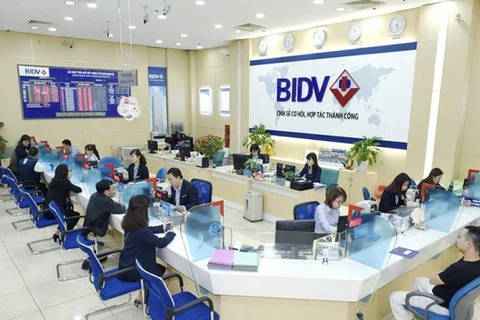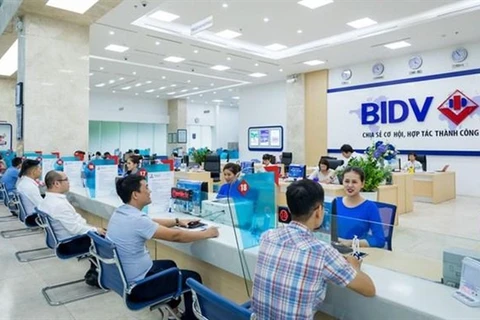Hanoi, (VNA) - Banking experts are of the view that despite some relaxation for banks that failed to meet Basel II standards, the State Bank of Vietnam (SBV) should stay firm to the Basel II target.
Many experts said in order to achieve the Basel II target, commercial banks first of all need to get absolute consensus of shareholders, the board of directors and the management board. Even then, it is impossible for all banks to achieve the Basel II standards in the short term.
“Emergency exit” for banks lagging behind
In 2019, the SBV gave preferential treatment in terms of business targets and plans to banks that early met the Basel II standards.
In fact, ACB, VPBank, Techcombank, MB and TPBank were allowed by the SBV to raise their credit quota by 3-4 percent, and some were allowed up to 17 percent, compared to the average quota of the entire sector.
Banking expert Can Van Luc said banks meeting Basel II standards were given higher credit quota because they themselves had good risk management, and transparent financial and business activities. Meanwhile, those which were restructuring and had high rates of bad debts would be given lower credit quota.
In 2020, though the management agency has not announced any sanction for banks failing to meet the Basel II standards, industry insiders said measures similar to those in 2019 would be applied.
Experts said it would be difficult for some banks, which are under special supervision and have difficulties in raising capital, to keep up with the roadmap to achieve Basel II.
For the part of the management agency, the SBV’s Circular 22/2019/TT-NHNN is considered an “emergency exit” for such banks. Under the document, the deadline for meeting the Capital Adequacy Ratio (CAR) stipulated in Circular 41 will be extended to January 1, 2023 for banks that have not achieved the requirement.
This is the second time the SBV has to delay the deadline for applying Basel II standards. The first time was in 2018 when the SBV set forth a roadmap for the 10 piloting banks.
Sharing the difficulties of banks, expert Nguyen Tri Hieu said it is not easy to implement Circular 41 regarding Basel II standards, as banks have to calculate risks for different debts. They also have to collect data from previous years, and raise capital to increase the CAR.
“Facing such difficulties, some banks will not be able to implement Circular 41 within 2020. We hope with an extension of one more year, they will be able to meet the SBV’s requirements as there is no other choice. By the end of 2021, banks which fail to realize Circular 41 are likely to put under special supervision,” Hieu said.
Staying firm to Basel II goal
However, banking experts said despite easing pressure on banks failing to meet Basel II target, the SBV should stay firm to the goal, because many countries in the world have started to apply Basel III standards. It is already late for Vietnam to push for Basel II standards now.
Le Trung Kien, deputy director of Department Two of the SBV’s Banking Supervision Agency, said banks failing to meet Basel II standards are meeting with difficulties, because an increasingly fierce competitive environment are forcing banks to develop new products and activities, seek new market segments and apply new technologies in the context of more complicated risk control.
On the other hand, Vietnam is yet to have any independent credit rating agencies, and the number of customers of credit ratings is too small compared to market size.
According to Kien, what is the most important now is to realise fully the benefits and importance of the application of Basel II, thus prompting drastic actions on the part of boards of directors, CEOs and all units of banks.
Sharing this view, expert Hieu said first of all commercial banks need to get absolute consensus of shareholders, the board of directors and the management board towards an advanced and transparent model of corporate governance and risk management. Investment in implementing Basel II and III should be done in a serious and methodological manner.
Besides, mechanisms are needed to encourage the work, while administrative restrictions on credit room and conditions for network expansion should be removed for banks that have implemented all three Basel II pillars and even Basel III.
Sharing his bank’s experience, Ha Hoang Dung, director in charge of risk management of VIB said the most difficult part for the bank was to fully understand the standards, as they are quite new.
“The first thing, we received close attention from the board of directors during the process, from mapping a strategy at first to working out detailed plans.
For issues that were too difficult, we invited foreign consultants to help with training. For processing big volume of data, we invested in systems. Only with such coordination, could we successfully apply the Basel II standards,” Dung said./.

























